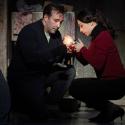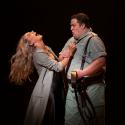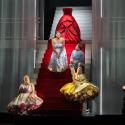What kind of regime, asks Gérard, talks of justice while killing poets? It’s a question the answer to which suggests itself all too swiftly this week, briefly turning a revolutionary romp of an opera into something rather more chilling. Playing things straight in his new production of Andrea Chénier (if wigs and lavender stockings, chandeliers and pastoral divertissements can be called straight), David McVicar may have missed a trick with a story that speaks with surprising clarity about the violence of political and ideological conflict. Or maybe he didn’t. This period production is the gilded and polished frame that showcases the Royal Opera doing what they do at their absolute best.
It’s hard to get past the spectacle of it all – elegant Ancien Régime interiors, lit so beautifully with early-evening warmth by Adam Silverman, giving way to cinematic street scenes. Yes, these revolutionaries are improbably shiny and recently washed, but this is Hollywood-does-history, Les Mis - The Opera, and it looks all the better for it.
In Pappano's hands a good score almost passes for a great one
It helps that the visuals are so entirely in sympathy not only with Illica’s libretto, but also with Antonio Pappano’s approach in the pit. In his hands a good score almost passes for a great one, sweeping doubts away in massive, enveloping string gestures and a final apotheosis of brass that crowns even the ecstatic final duet between Maddalena and Chénier. The Royal Opera House Orchestra has rarely sounded better. They support an enormous cast of over 20 named principals (is there a bigger one in the repertoire?), a generously bolstered chorus, and a troupe of actors and dancers.
 The combined forces all come together to tell a story that Dr Alexandra Wilson’s programme essay invites us to see not necessarily as penury-and-prostitutes verismo, but perhaps as more of a romance, with more than a hint of Grand Opera. It’s an approach that privileges interiority over social commentary, one that might falter with weaker leads. But Jonas Kaufmann and Eva-Maria Westbroek (pictured right) once again lift all around them with the tenderness and conviction of two exceptional performances, calibrating an emotional arc that climaxes with unexpected ferocity in the Act IV finale.
The combined forces all come together to tell a story that Dr Alexandra Wilson’s programme essay invites us to see not necessarily as penury-and-prostitutes verismo, but perhaps as more of a romance, with more than a hint of Grand Opera. It’s an approach that privileges interiority over social commentary, one that might falter with weaker leads. But Jonas Kaufmann and Eva-Maria Westbroek (pictured right) once again lift all around them with the tenderness and conviction of two exceptional performances, calibrating an emotional arc that climaxes with unexpected ferocity in the Act IV finale.
Kaufmann plays a long game, underplaying “Un dì all'azzuro spazio”, allowing its stand-alone beauty to dissolve into the narrative flow. Leaning slightly more into “Credi al destino”, he still holds back, exercising tremendous control in order to release all in the courtroom confrontation of “Sì fui soldato”. This outburst must surprise the character as much as his onlookers if it is to succeed, to find an anger not available to him in the salon of the start. Westbroek is a worthy partner, and if her voice speaks too much of wisdom to completely convince as the Act I ingénue, she more than makes up for this in the pathos and warmth of Acts III and IV.
It’s a star-squandering cast – blink and you’ll miss Peter Coleman-Wright and Peter Hoare – but it’s a particular bonus seeing Rosalind Plowright (the Royal Opera’s Maddalena at their last Chénier staging, 30 years ago) return as the Contessa di Coigny, a brittle performance setting us up for a disquieting rethink at “La mamma morta”. Željko Lučić’s Gérard took a while to settle on opening night, but “Nemico della Patria” finally flowered, this one opportunity to humanise a two-dimensional character seized with affecting intensity.
 So much of the character of the production comes from context, whether the sets or the chorus, actors and minor character roles. Adrian Clarke’s Mathieu compresses a life-story into his few moments in Act III, a cameo that sets the tone for a courtroom filled with lively, chattering humanity rather than a block-choreographed collective. It’s a shame the foreground action is so utterly absorbing that you miss more of their tiny details than you catch.
So much of the character of the production comes from context, whether the sets or the chorus, actors and minor character roles. Adrian Clarke’s Mathieu compresses a life-story into his few moments in Act III, a cameo that sets the tone for a courtroom filled with lively, chattering humanity rather than a block-choreographed collective. It’s a shame the foreground action is so utterly absorbing that you miss more of their tiny details than you catch.
If denial and abstinence are the watchwords of your January, then this new Chénier may not be for you. There’s spectacle and excess here in bucketloads, matching Giordano’s score gesture for gesture. But there’s also music-making of unadorned quality, simple excellence that stands on its own merits. This Andrea Chénier is a great show, whether you close your eyes or keep them open. You can’t say fairer than that.















Add comment